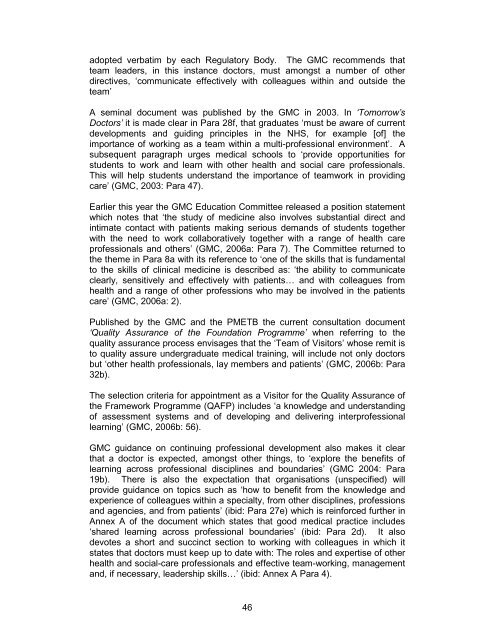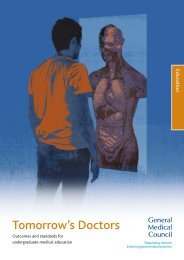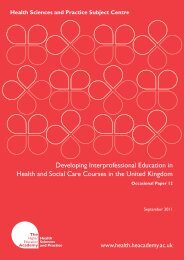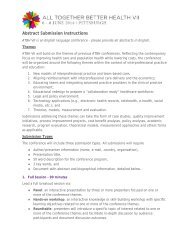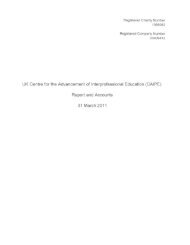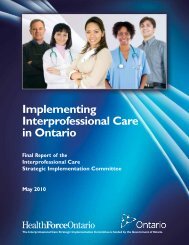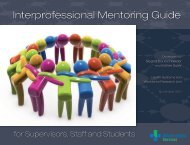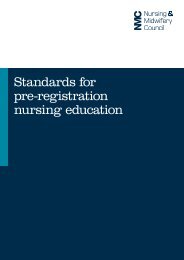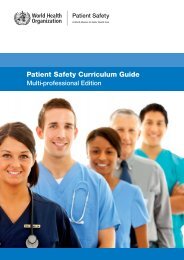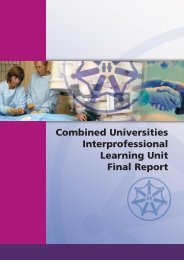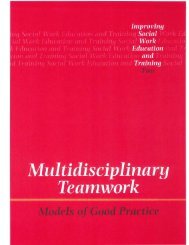Health and Social Care Policy and the Interprofessional ... - CAIPE
Health and Social Care Policy and the Interprofessional ... - CAIPE
Health and Social Care Policy and the Interprofessional ... - CAIPE
Create successful ePaper yourself
Turn your PDF publications into a flip-book with our unique Google optimized e-Paper software.
adopted verbatim by each Regulatory Body. The GMC recommends that<br />
team leaders, in this instance doctors, must amongst a number of o<strong>the</strong>r<br />
directives, ‘communicate effectively with colleagues within <strong>and</strong> outside <strong>the</strong><br />
team’<br />
A seminal document was published by <strong>the</strong> GMC in 2003. In ‘Tomorrow’s<br />
Doctors’ it is made clear in Para 28f, that graduates ‘must be aware of current<br />
developments <strong>and</strong> guiding principles in <strong>the</strong> NHS, for example [of] <strong>the</strong><br />
importance of working as a team within a multi-professional environment’. A<br />
subsequent paragraph urges medical schools to ‘provide opportunities for<br />
students to work <strong>and</strong> learn with o<strong>the</strong>r health <strong>and</strong> social care professionals.<br />
This will help students underst<strong>and</strong> <strong>the</strong> importance of teamwork in providing<br />
care’ (GMC, 2003: Para 47).<br />
Earlier this year <strong>the</strong> GMC Education Committee released a position statement<br />
which notes that ‘<strong>the</strong> study of medicine also involves substantial direct <strong>and</strong><br />
intimate contact with patients making serious dem<strong>and</strong>s of students toge<strong>the</strong>r<br />
with <strong>the</strong> need to work collaboratively toge<strong>the</strong>r with a range of health care<br />
professionals <strong>and</strong> o<strong>the</strong>rs’ (GMC, 2006a: Para 7). The Committee returned to<br />
<strong>the</strong> <strong>the</strong>me in Para 8a with its reference to ‘one of <strong>the</strong> skills that is fundamental<br />
to <strong>the</strong> skills of clinical medicine is described as: ‘<strong>the</strong> ability to communicate<br />
clearly, sensitively <strong>and</strong> effectively with patients… <strong>and</strong> with colleagues from<br />
health <strong>and</strong> a range of o<strong>the</strong>r professions who may be involved in <strong>the</strong> patients<br />
care’ (GMC, 2006a: 2).<br />
Published by <strong>the</strong> GMC <strong>and</strong> <strong>the</strong> PMETB <strong>the</strong> current consultation document<br />
‘Quality Assurance of <strong>the</strong> Foundation Programme’ when referring to <strong>the</strong><br />
quality assurance process envisages that <strong>the</strong> ‘Team of Visitors’ whose remit is<br />
to quality assure undergraduate medical training, will include not only doctors<br />
but ‘o<strong>the</strong>r health professionals, lay members <strong>and</strong> patients’ (GMC, 2006b: Para<br />
32b).<br />
The selection criteria for appointment as a Visitor for <strong>the</strong> Quality Assurance of<br />
<strong>the</strong> Framework Programme (QAFP) includes ‘a knowledge <strong>and</strong> underst<strong>and</strong>ing<br />
of assessment systems <strong>and</strong> of developing <strong>and</strong> delivering interprofessional<br />
learning’ (GMC, 2006b: 56).<br />
GMC guidance on continuing professional development also makes it clear<br />
that a doctor is expected, amongst o<strong>the</strong>r things, to ‘explore <strong>the</strong> benefits of<br />
learning across professional disciplines <strong>and</strong> boundaries’ (GMC 2004: Para<br />
19b). There is also <strong>the</strong> expectation that organisations (unspecified) will<br />
provide guidance on topics such as ‘how to benefit from <strong>the</strong> knowledge <strong>and</strong><br />
experience of colleagues within a specialty, from o<strong>the</strong>r disciplines, professions<br />
<strong>and</strong> agencies, <strong>and</strong> from patients’ (ibid: Para 27e) which is reinforced fur<strong>the</strong>r in<br />
Annex A of <strong>the</strong> document which states that good medical practice includes<br />
‘shared learning across professional boundaries’ (ibid: Para 2d). It also<br />
devotes a short <strong>and</strong> succinct section to working with colleagues in which it<br />
states that doctors must keep up to date with: The roles <strong>and</strong> expertise of o<strong>the</strong>r<br />
health <strong>and</strong> social-care professionals <strong>and</strong> effective team-working, management<br />
<strong>and</strong>, if necessary, leadership skills…’ (ibid: Annex A Para 4).<br />
46


